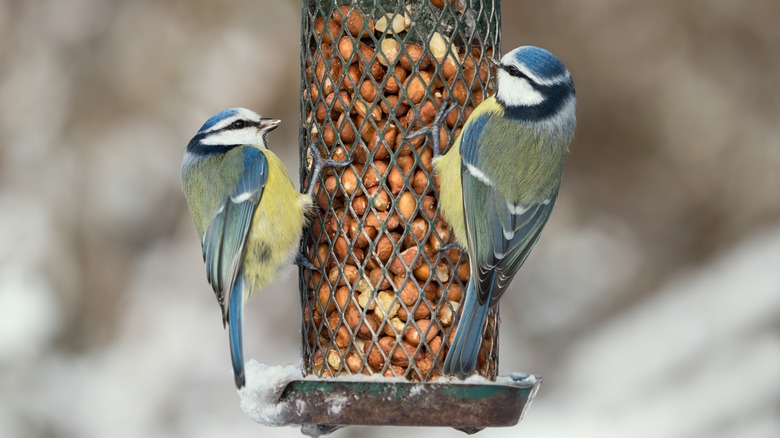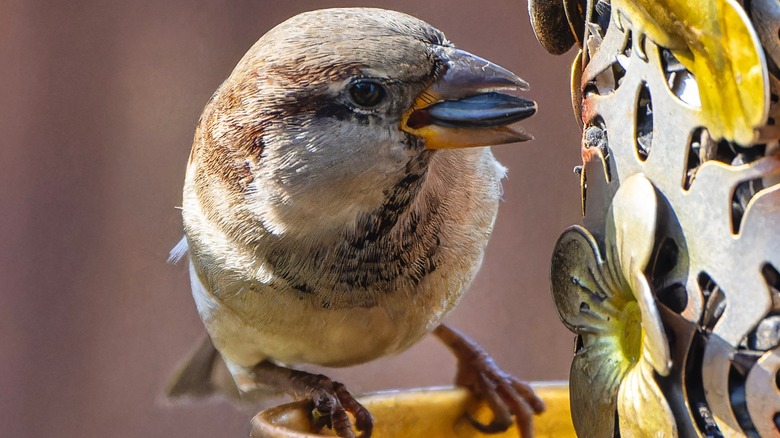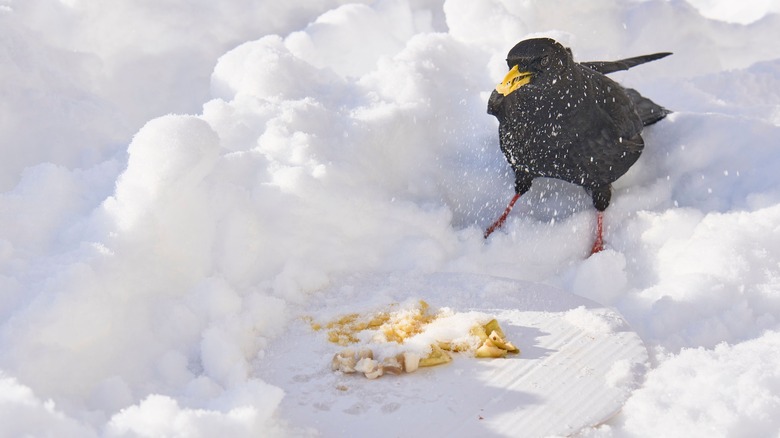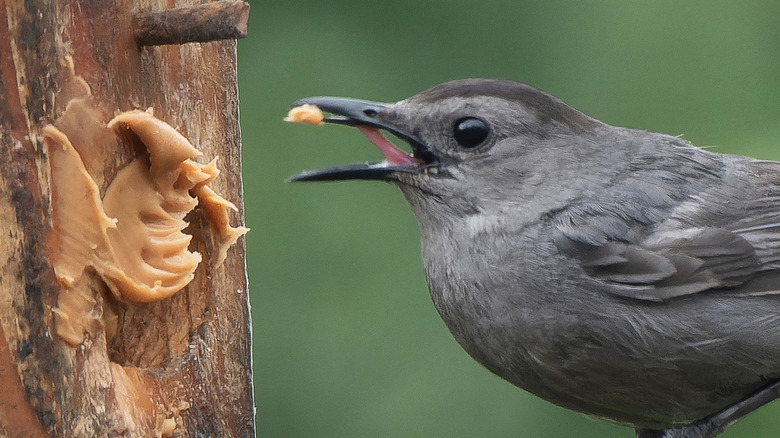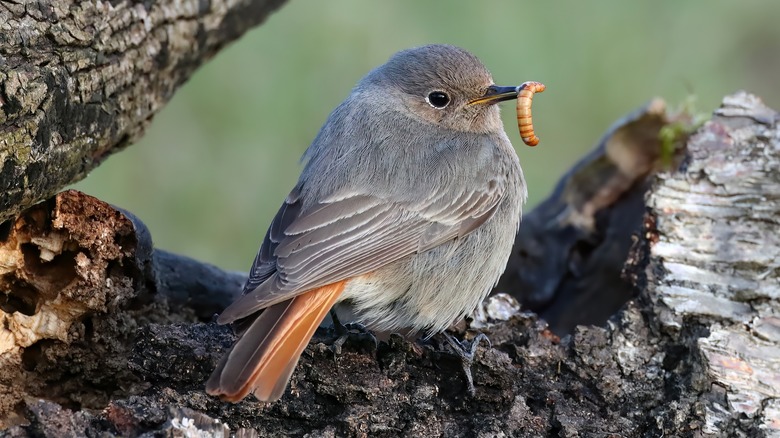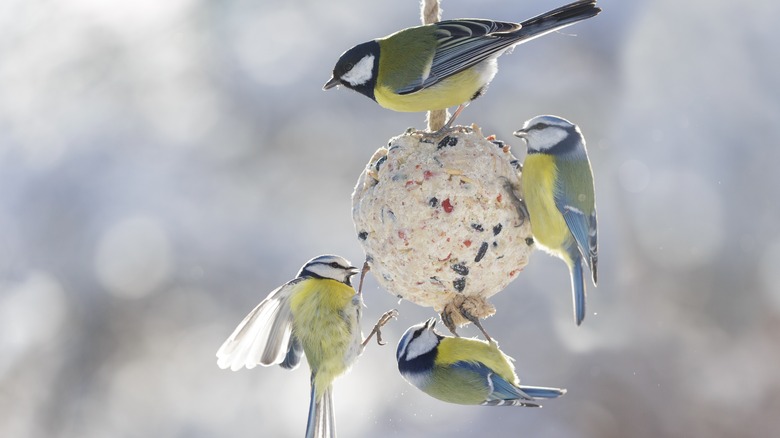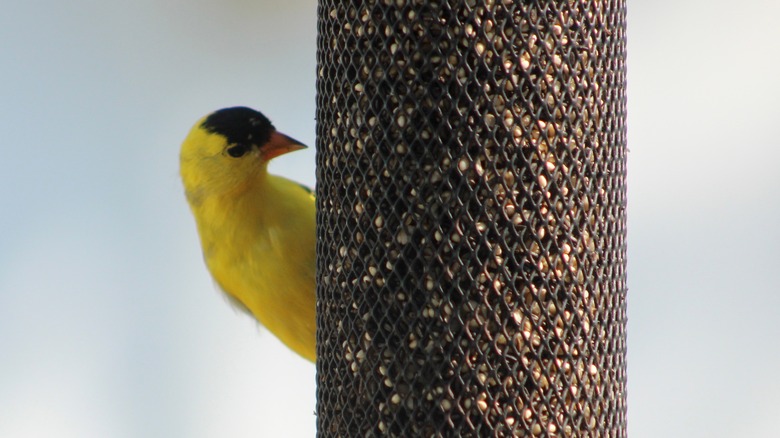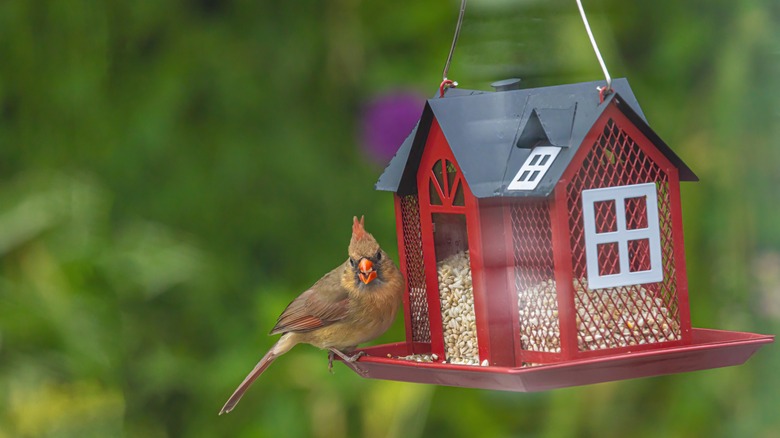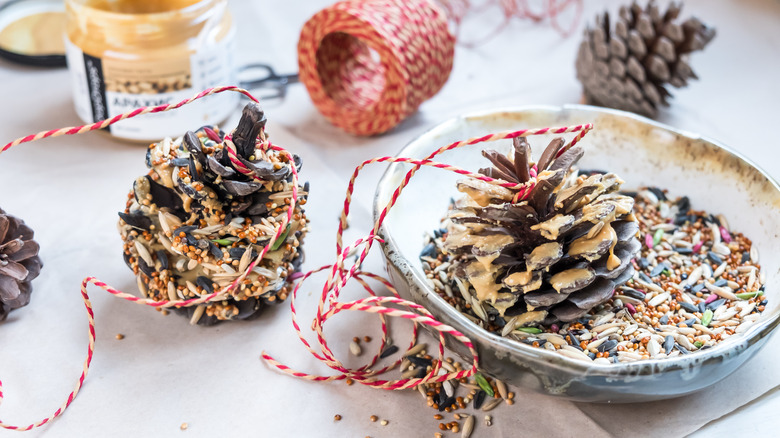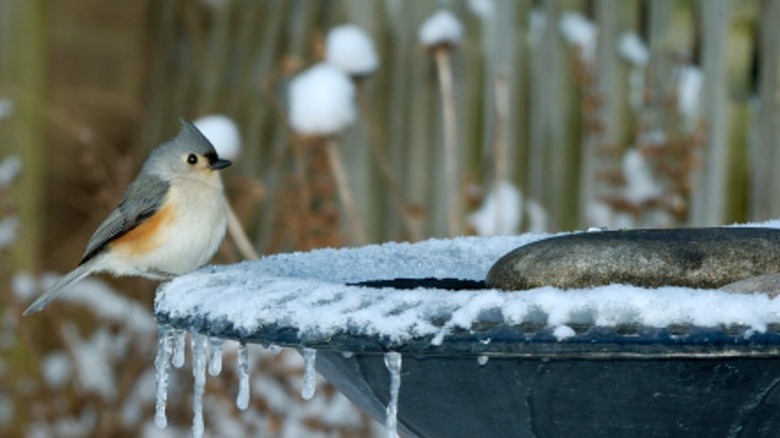The Best Bird Foods To Keep The Feathered Friends In Your Yard Happy In The Winter
We may receive a commission on purchases made from links.
It's tough to be a bird during the winter. Beyond the obviously colder weather, food is certainly scarce. Even if the ground isn't covered with snow, birds still aren't able to maintain their spring and summer insect-rich diet. Doing your part and supplying them with some safe and nutritious foods can have a huge impact. Not only will it help attract birds to your yard during the winter and help them survive through the colder months, but it will also set them up for a prosperous mating season in the spring. Healthier, well-fed birds lay eggs earlier, and the chicks that hatch from those eggs typically start off with a healthier weight themselves.
However, before you just toss any extra seeds or bits of food outside, it's important to make sure that you are selecting the best items for the birds that you're likely to find in your yard this winter. With the cold temperatures and lack of other nutrient sources, you want to choose foods that provide the energy your feathered friends need to make it through the season. So, we've rounded up a list of some of the best ones to try.
It's a safe bet that birds will happily eat black-oil sunflower seeds from your feeder
If you're going to keep only one kind of seed in your bird feeder this winter, choose black-oil sunflower seeds. These are an ideal winter food for birds because of their higher oil content. If you're not familiar with black-oil sunflower seeds, they are slightly different from the more standard sunflower seeds. They were specifically cultivated to deliver a higher ratio of fat, which is what makes them such an ideal winter food for the birds.
One other reason that black-oil sunflower seeds are such an excellent choice for your bird feeder is that several different species will feast on them. Their thinner shell makes it easier for smaller birds with weaker beaks, including chickadees and finches, to break into them and enjoy the nutritious and delicious kernels inside. Plus, studies have shown that many birds actually prefer black-oil sunflower seeds. So, you can purchase a bag like Wagner's 25-Pound Black Oil Sunflower Seeds and attract feathered friends to your yard.
Offer fresh fruits to birds during the winter
Adding birdseed to your feeder is one way to support your feathered friends, but it certainly isn't your only option. You can also consider setting out some fresh fruits to give the birds some essential nutrients during the cold and barren winter months. Some of the fruits that they may enjoy include sliced oranges, apples, and mangoes. Red, yellow, and orange fruits, like cantaloupe and papaya, can be especially beneficial to birds during the winter as they are a good source of vitamin A, which they need to survive.
A benefit of offering fruit to the birds is that you might attract a few that otherwise wouldn't visit your feeder, such as thrushes or bluebirds. Other species that may also enjoy the offerings include catbirds, orioles, and mockingbirds. To maximize the nutritional content for the birds you feed, opt for fresh or frozen fruit over freeze-dried varieties. And, canned fruit often has too much salt or sugar that it might not be safe for the birds.
Peanuts and peanut butter deliver protein to help birds make it through the winter
Feeding birds in the winter is all about offering them nutritious and high-fat foods that will provide the energy they need to survive. Peanuts and peanut butter are two options with a high fat content that can help them can fuel up. For the larger birds in your yard, you can even consider offering peanuts in the shell as they'll be able to crack through them to get at the yummy snack inside it. Some of these larger peanut-enjoying species include magpies, woodpeckers, and jays. To feed smaller bird species, such as wrens, consider shelling the peanuts first.
If you're going to put out peanut butter for the birds, there are a few considerations to keep in mind. First, many people are concerned with whether putting peanut butter in their bird feeder is actually a safe choice. It is considered safe, as long as you take some precautions. First, always choose a natural peanut butter that does not have xylitol in it. While there has not been as much research done on the effects of xylitol on birds as there has been on dogs, it is not considered a safe additive. Next, consider making the peanut butter a little less sticky and oily by mixing in some cornmeal before putting it out. This can help ensure it doesn't stick to the mouths or feathers of the birds.
Many backyard birds will be delighted with some mealworms
Mealworms, which are the larvae of darkling beetles, are another nutritious option to feed the birds in your barnyard this winter. While eating beetle larvae probably sounds less-than-appetizing to you, they are a favorite of our feathered friends. Beyond being simply tasty, mealworms are a particularly good choice for the winter. They are high in vitamins, calcium, and protein to support the nutritional needs of the birds.
Because of how many different bird species happily eat mealworms, including titmice, nuthatches, and chickadees, there are some important considerations to keep in mind before feeding them. If there's a specific type of bird that you want to feed and help during the cold winter, you will need to be very strategic about how and where you offer the mealworms. Think about feeder placement, size, and design. For example, this Caged Bird Feeder from Mosloly, is designed to prevent larger birds (and other animals, such as squirrels), from getting at the food you put inside of it. Regardless of the feeder type that you choose, you'll want to block any drainage holes if you plan to use it to feed live mealworms. Otherwise, the larvae may be able to escape before the birds have a chance to enjoy them. Alternatively, you can consider dried mealworms, like the Kaytee Mealworms from Amazon. However, freeze-dried ones should not be fed to any nestlings, as they are dehydrated and won't supply these young birds with the water they also need.
Suet is a high-fat food that is perfect for winter feeding
When you're searching for a high-fat, high-energy food for birds this winter, you can't go wrong with suet, a type of beef or mutton fat. Birds are able to digest this fatty food and metabolize it with ease. This provides them with the energy their bodies need during the cold winter months.
Several types of birds enjoy suet and will benefit from being fed it over the winter. Some of these species include chickadees, woodpeckers, starlings, and jays. You may be able to find cakes of it in the pet department at your local grocery store, and you can hang it in a suet feeder where you'd like to attract birds to your yard. Options like the More Birds Double Suet Cage Bird Feeder can even hold two cakes, so they don't need to be refilled as frequently. If you don't have a feeder, you can also just spread some suet onto a pine cone or some tree bark to offer it to the birds. Some bird food manufacturers also sell suet cakes, like the Heath Outdoor All-Season High Energy Suet, with the animal fat, seeds, and fruit all mixed together.
Nyjer seed will be enjoyed during the winter by small finches in your yard
Nyjer seeds, which you may also see called thistle, come from the Guizotia abyssinica. This annual herb, which is native to Africa, produces small black seeds that have a very high ratio of oil (between 30% and 40%). It also has a thin shell so birds of smaller sizes can enjoy it. Nyjer seeds are a favorite of non-migratory birds, so it's an ideal way to attract the ones that are sticking around for winter.
While several species love Nyjer seeds, like this 10-pound bag from Wagner's on Amazon, it is a more expensive option, especially given the smaller size of the seeds. For this reason, many bird lovers try to reserve it for some smaller bird species, such as pine siskins and goldfinches. Specialized feeders, such as Gray Bunny's Thistle Feeder, offer smaller perches and only tiny holes to help prevent larger birds and other wildlife from getting at the seeds.
Offer safflower seeds to the birds visiting your yard this winter
As you're trying to decide what to do with your bird feeder during the winter, consider filling it with safflower seeds for your feathered friends. They are another option that is high in fat and protein, which birds can metabolize to create the energy they need to survive cold weather. There are a few notable differences between safflower seeds and black-oil sunflower seeds. Of the two, black-oil sunflower seeds are a better source of fat, providing more energy for the birds than safflower seeds. Sunflower seeds also have a thinner shell, making them easier for birds, particularly smaller ones, to open.
So why consider this alternative, such as the Lyric Golden Safflower Seeds, over black-oil sunflower seeds? Well, beyond offering some variety to the birds in your yard, safflower seeds may be a better option if squirrels have been getting into your feeder. The seeds are less desirable to them than some other varieties. They may also be a good choice if you're trying to limit the number of starlings that take food from your feeders since the seeds are tough for their beaks to crack into. Some birds that do enjoy safflower seeds include cardinals, chickadees, and sparrows.
Try making homemade Marvel Meal to give a special treat to your feathered friends
While you can always buy seeds to simply pour into your bird feeder, you can also make some homemade treats for your backyard visitors in the winter. One such option to consider is Marvel Meal. This recipe combines some of the nutritious ingredients covered above, including high-fat peanut butter and black oil sunflower seeds. It also includes vegetable shortening, cornmeal, and flour (not self-rising). The shortening offers an additional source of fat and is also relatively easy for birds to digest, while the cornmeal and flour work to give the sticky peanut butter a grittier texture.
Once prepared, there are different ways to offer this special treat to the birds. You can wipe it directly onto tree bark, spread it over a simple bird feeder made by hanging a pine cone, or freeze it in chunks to add to your suet bird feeder. Because of the hands-on nature of this project, this is also a good way to involve children in helping to support the birds in the winter. Some of the many birds that are likely to enjoy such a treat include wrens, bluebirds, and chickadees.
Don't forget to also offer the birds fresh water
While providing food is important, you should also look for opportunities to provide access to fresh water for the birds in your backyard this winter. Just as the freezing weather makes it harder for birds to find food, it also limits their supply of water. Beyond preventing them from getting dehydrated, birds also need water to keep their feathers clean. When birds' feathers are dirty, they do not offer optimal insulation to protect their bodies from the harsh outdoor temperatures.
Keeping water fresh (and unfroze) in the winter is more challenging than during other times of the year, but it's not impossible. Consider purchasing a product that offers a winter-friendly way to provide water, such as the Farm Innovators All Season Outdoor Heated Bird Bath. Be sure to check on the bath regularly, clean it, and refill it with water to maintain a fresh supply for the birds. If you already have a bird bath, you can also purchase a standalone heater. This Bird Bath Heater from Gesail will keep the water from turning into ice.
